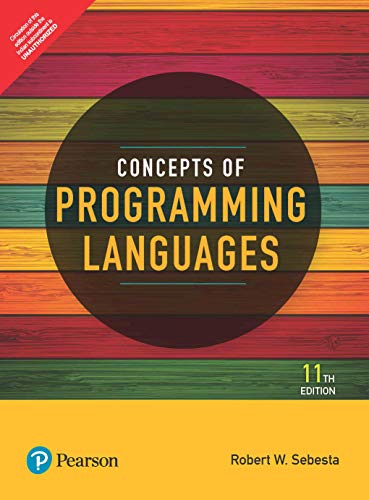
Synopsis
Concepts of computer programming languages introduces students to the fundamental concepts of computer programming languages and provides them with the tools necessary to evaluate contemporary and future languages. An in-depth discussion of programming language structures, such as syntax and lexical and syntactic analysis, also prepares students to study compiler design. <Br> features: 1. Updated! The most current information on contemporary computer programming languages 2. The fundamental concepts of programming languages are taught through detailed examination of specific languages table of Contents: br>Chapter 1) preliminaries br>Chapter 2) evolution of the major programming languages br>Chapter 3) describing syntax and semantics br>Chapter 4) lexical and syntax analysis 161 br>Chapter 5) names, bindings, and scopes 197 br>Chapter 6) Data types br>Chapter 7) expressions and assignment statements 301 br>Chapter 8) statement-level control structures br>Chapter 9) subprograms br>Chapter 10) implementing subprograms br>Chapter 11) abstract data types and encapsulation constructs br>Chapter 12) support for object-oriented programming br>Chapter 13) concurrency br>Chapter 14) exception handling and event handling br>Chapter 15) functional programming languages br>Chapter 16) logic programming languages . Concepts of computer programming languages introduces students to the fundamental concepts of computer programming languages and provides them with the tools necessary to evaluate contemporary and future languages. An in-depth discussion of programming language structures, such as syntax and lexical and syntactic analysis, also prepares students to study compiler design. <Br> features: 1. Updated! The most current information on contemporary computer programming languages 2. The fundamental concepts of programming languages are taught through detailed examination of specific languages table of Contents: br>Chapter 1) preliminaries br>Chapter 2) evolution of the major programming languages br>Chapter 3) describing syntax and semantics br>Chapter 4) lexical and syntax analysis 161 br>Chapter 5) names, bindings, and scopes 197 br>Chapter 6) Data types br>Chapter 7) expressions and assignment statements 301 br>Chapter 8) statement-level control structures br>Chapter 9) subprograms br>Chapter 10) implementing subprograms br>Chapter 11) abstract data types and encapsulation constructs br>Chapter 12) support for object-oriented programming br>Chapter 13) concurrency br>Chapter 14) exception handling and event handling br>Chapter 15) functional programming languages br>Chapter 16) logic programming languages .
"synopsis" may belong to another edition of this title.
Other Popular Editions of the Same Title
Search results for Concepts of Programming Languages, 11th edition
Concepts of Programming Languages, 11th edition
Seller: BooksRun, Philadelphia, PA, U.S.A.
Paperback. Condition: Good. 11th. It's a preowned item in good condition and includes all the pages. It may have some general signs of wear and tear, such as markings, highlighting, slight damage to the cover, minimal wear to the binding, etc., but they will not affect the overall reading experience. International edition. Seller Inventory # 9353438896-11-1-7


